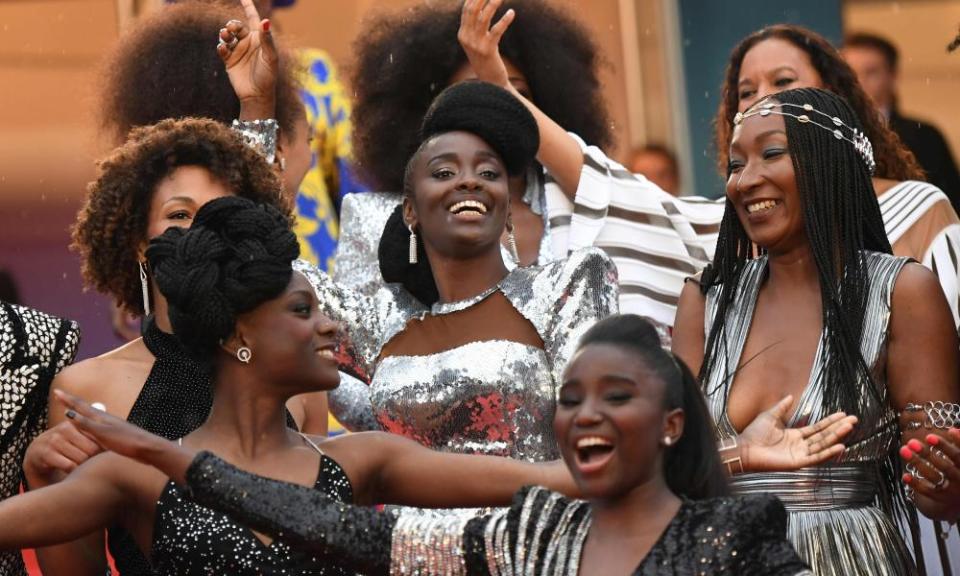The thin, white lie: challenging the 'French women' stereotype

What comes to mind when you hear the word “Parisienne”? For most of us, the female in the French capital is, historically, a familiar figure: stylish, seductive and cultured, whiling away her days smoking cigarettes and drinking fine wine in cafes. She has been personified by a long list of women: Brigitte Bardot, Catherine Deneuve, Inès de la Fressange, Laetitia Casta. Much like the Eiffel Tower, the Parisienne has become a symbol of national identity – so much so that, since 1969, these same celebrities have even served as models for busts of Marianne, the personification of the French Republic that adorns town halls across the country.
The Parisienne (a term often applied to French women in general) is above all an object of global consumption: she has helped sell endless red lipsticks, striped T-shirts, perfumes, and even her home city, with foreigners falling in love with its postcard beauty and its flawless inhabitants. She has found her place on Instagram, in the form of influencers Jeanne Damas and Adenorah, who sell their own fashion and beauty brands directly to their followers. Women’s magazines around the world dedicate an endless stream of clickbait articles to “French secrets”, from The One Piece Every Chic French Girl Has in Her Winter Wardrobe, to Why French Women Don’t Contour. The former article proclaims: “It’s a widely accepted fact that French women all possess a seemingly universal birthright that includes the secret to slept-in hair, invisible makeup, and a no-fuss (if otherwise nonexistent) approach to fitness.” All women are apparently just one diet, dress or face cream away from resembling their French counterparts.
How to Be Parisian contained the tip: 'Always be fuckable ... even [when] picking the kids up from school. You never know'
Much like the woman herself, the myth of the Parisienne doesn’t seem to age – until now, maybe. In the wake of the #MeToo movement, women in France have begun speaking out against it as a harmful stereotype that excludes the majority of French women, a false, unattainable image that erases the country’s black, Asian and LGBTQ populations.
Journalist Lindsey Tramuta’s new book, The New Parisienne: The Women and Ideas Shaping Paris, profiles 40 women living in the French capital who don’t necessarily fit this very narrow mould, including disability activist Elisa Rojas, rabbi Delphine Horvilleur and Paris’ recently reelected Spanish-French mayor, Anne Hidalgo. “The Parisienne maybe represents 1% of the Parisian population, in a certain neighbourhood. But she’s the one we see time and time again and that’s a real problem,” Tramuta tells me from her home in Paris, where she has lived for the past 15 years since leaving the US. She quickly grew tired of the cliches about French women, repeated in films, magazines and advertising campaigns: “The way it’s been branded and marketed in that way to capture attention and prey on insecurities, it just made me angry.”
Tramuta’s first book, The New Paris: The People, Places and Ideas Fueling a Movement, went beyond the beauty of the capital to focus on how its creative locals were driving social change. With The New Parisienne, she hopes to shift the conversation around Paris’s female residents. “It’s about representing women better and I think the Parisienne, who has benefited from this celebrity cult status for so long, needs to be reframed,” she says.
The New Parisienne stands in stark contrast to a multitude of books that have bolstered this simplistic image of French women. Mireille Giuliano’s 2004 book French Women Don’t Get Fat became a worldwide bestseller with its advice on how to “enjoy food and stay slim and healthy”, and was followed 10 years later by French Women Don’t Get Facelifts. In 2011’s Parisian Chic: A Style Guide, celebrity model De la Fressange shared the “well-kept secrets of how Parisian women maintain effortless glamour and a timeless allure,” while model and music producer Caroline de Maigret co-authored How to Be Parisian Wherever You Are. The latter includes tips such as: “Always be fuckable: when standing in line at the bakery on a Sunday morning, buying champagne in the middle of the night, or even picking the kids up from school. You never know.” Her second book Older, But Better, But Older, published in 2019, is also dedicated to the art of ageing like a French woman.

Tramuta is not the only writer challenging the stereotype. Franco-British journalist Alice Pfeiffer’s 2019 book Je Ne Suis Pas Parisienne tackles the myth in both the fashion world and in broader society. Pfeiffer, who grew up in Paris but studied gender studies at the London School of Economics, examines the cliche while recounting her own experience as a young woman in France and the UK. While there is only one Parisienne (inevitably white and upper-class), there are a multitude of Londoners. “At first glance,” writes Pfeiffer, “There are at least two myths of Londoners, in perfect social dichotomy: the aristocratic English rose (from Alice in Wonderland to Cara Delevingne) with the stiff upper lip of west London, and the Cockney Punkette of the city’s working class neighbourhoods (Kate Moss or Amy Winehouse).”
The key difference, says Pfeiffer, lies in the UK describing itself as a multi-faith society, while France is thought of as the embodiment of laïcité (a version of state secularism). “The first celebrates multiplicity, while the second imposes a single and allegedly universal freedom,” she writes. French identity is based on “a single, indivisible republic” that makes no distinction among its citizens, and where communautarisme – any division of the republic into individual identity groups– must be prevented. The French state is supposed to be colour-blind, and does not collect data on race, ethnicity or religion. However, unlike New York or London, “Paris tends to use the same image of whiteness in its marketing,” says journalist, film-maker and activist Rokhaya Diallo, one of the women profiled in Tramuta’s book. Denying the very existence of race, she says, means that “in France, we don’t really have a conversation about it”.

In 2018, actor Aïssa Maïga initiated Noire N’Est Pas Mon Métier (Black Is Not My Profession), a collective essay by 16 black French actresses denouncing the stereotypes and the lack of equal opportunity in the film industry. At this year’s César awards, Maïga called out the lack of diversity on French screens by naming the black people in the audience (just 12 out of 1,600). “We survived whitewashing, blackface, tons of drug dealer roles, housekeepers with a Bwana accent, we survived the roles of terrorists, all the roles of hypersexualised girls. But we are not going to leave French cinema alone,” she proclaimed. The discomfort in the room was palpable. When Roman Polanski was awarded the prize for best director, Maïga walked out of the ceremony along with Adèle Haenel, the first high-profile actress in France to speak out about abuse in the country’s film industry. While Maïga’s speech went viral, conservative newspapers were quick to describe it as “racialist” and “arrogant”. Right-wing MEP Nadine Morano suggested that if Maïga “was not happy with seeing so many white people in France,” she should “go back to Africa”.
In recent weeks, the killing of George Floyd has sparked large anti-racism protests across France, and has forced a significant shift in the attention paid to discrimination. “There is a conversation happening now,” says Diallo. “Not only around French women but also non-white French people.” The rejection of stereotypes like the Parisienne fits into a debate about how women and minorities are represented in French society. “People are taking more of an interest, they’re becoming more vocal,” says Tramuta. “And it’s very hard to avoid questioning what our countries and our companies are doing to uphold some of these old, tired values and value systems.”
The New Parisienne: The Women and Ideas Shaping Paris is published by Abrams & Chronicle on 7 July.


